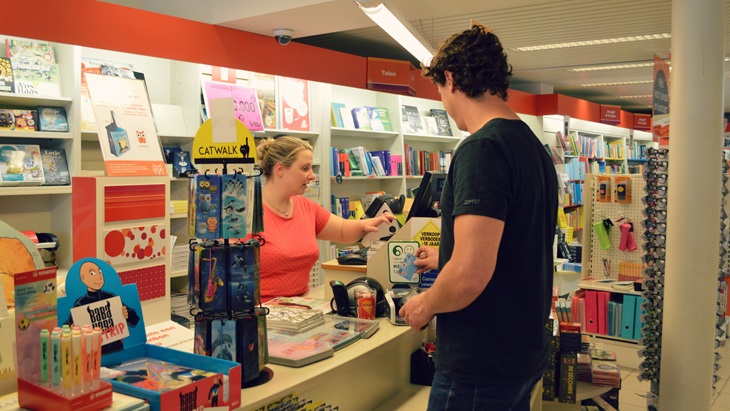Standaard Boekhandel is a book retailer with a strong position as a market leader in Belgium and with over 200 stores throughout the country. They want to know how customers perceive their brand to remain relevant in a competitive market that's becoming increasingly more digital.
Hello Customer is our ‘customer pulse monitor’. It keeps us nurtured with customer insights, it makes sure we keep track of our performance so we can improve it. It’s like putting on your activity tracker when you're going for a run: Hello Customer tells us if we're on track.

Standaard Boekhandel used for a long-time mystery shopping and market research to evaluate the performance of their brand and their stores. Nevertheless, they accepted an invitation to discover Hello Customer. “We quickly realized that Hello Customer could offer us another solution.” That was confirmed once the company begin to use the platform. “The tool gave us additional insights into what customers are increasingly doing: sharing their opinions.” Customer are now more informed and more exigent, speaking up when they are not satisfied with something. “Most of the time, this is perceived as negative. But in fact, it’s actually a positive thing. Hello Customer shows us how our customers perceive the company, the stores and the changes we are implementing”. Not to mention that market research requires a lot of preparation and time, whereas Hello Customer provides a constant stream of real-time feedback.
“We only see what we really need. But if you want to go further, that’s also possible. Just take a look at the dashboard and you’ll get a lot of relevant information based on your role in the company, whether you’re an employee, a manager or a member of the executive team. That’s what appealed to me”.
From the start, Standaard Boekhandel provided enough context and information for the implementation of Hello Customer. “As a company, there are always some risks when you start using a feedback platform. But Hello Customer quickly showed us that the majority of customer feedback is positive.”
It’s important for Standaard Boekhandel that their employees understand that the platform is there to help them rather than control them.
“Feedback about real-life interactions allows you to stay in touch with your customers.
Employees receive immediate approval of what motivates them to work for us: a passion for books. If they recommend the right book to a customer, they quickly receive feedback: “Good job!”. On the one hand, we discovered things that have a big impact on the company. “But most of the time, it’s a lot of smaller issues that we can fix to improve the customer experience in an easy way. “One store had one recurring feedback: “it’s too bad that the queue is so long because I only have a one hour lunch times”. Indeed, the store was understaffed during the lunch break. The Hello Customer platform allow us to quickly spot these problems through the constant flow of feedback. This offers an advantage over the mystery shopper. “You have to be lucky that the mystery shopper came at lunchtime”.
Standaard Boekhandel also receives feedback on more important directive guidelines. “ As a company, we want to diversify our services. Through their feedback, our customer help us define our priorities, so we can stay on track.” Several customers wrote: “it’s too bad that my Standaard Boekhandel doesn’t have books in English.” “This means that our customers are loyal, but for a problem that can be easily fixed, they have to go to a competitor”. Standaard Boekhandel has decided to increase its assortment of English-language books throughout the country. “We are
getting feedback on this as well: the customers confirms that we made the right decision”.

“Customer culture is a team effort. That’s why we organize recurring seminars with all of our store teams”. The seminar focused on two topics: how to develop a customer-centric mindset, and how to turn satisfied customers into brand ambassadors.
One branch in particular always received great results. So, we asked the store team to share their best practices. How do you achieve those results? This can help their colleagues to perform better, and is also received well by other teams as it’s not always easy to know what you can do better, and they appreciate the help.
Each store was asked to provide input on their understanding of customer centricity and on how they put in into practice. What obstacles do they face? What solutions do they offer to make the customer experience seamless? “The stores that get the highest scores help others put it into practice”. “The key is to put your customer first. Welcome them and be available. People talk too much about customer centricity as an umbrella term, but it’s a much broader concept.”
What sets companies apart in an omnichannel environment? People. Whether it’s employees or customers who still visit a physical bookstore. “Hello Customer gives us a sense of recognition: ‘We are happy to have a Standaard Boekhandel in our city’.” This has a big motivational aspect”. “The platform provides us with interesting and useful information. What attracts customers who still visit our physical stores? Which opportunities for improvement can we still find?” “We all tend to look too much at what’s wrong. Humans do it almost by nature.” But customer feedback counters that tendency. “Hello Customer shows us what’s going well, it makes our brand and store strengths explicit."
The book market is constantly changing, and retail has evolved to an increasingly omnichannel environment. Thanks to customer feedback, we reduced the time to pick up online purchases from two hours to half an hour. We coach our employees to be responsive when a customer walks into a store. What does it take to adapt to an environment that is becoming increasingly digital and dynamic? As a company, you are constantly looking for solutions. And the customer puts them into words through feedback. Why do we make these decisions? Well, because the customer pointed them out as priorities.
Reach out today and discover how we can help you achieve your business goals.